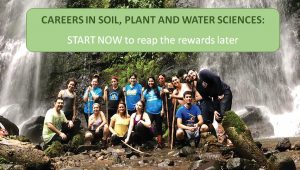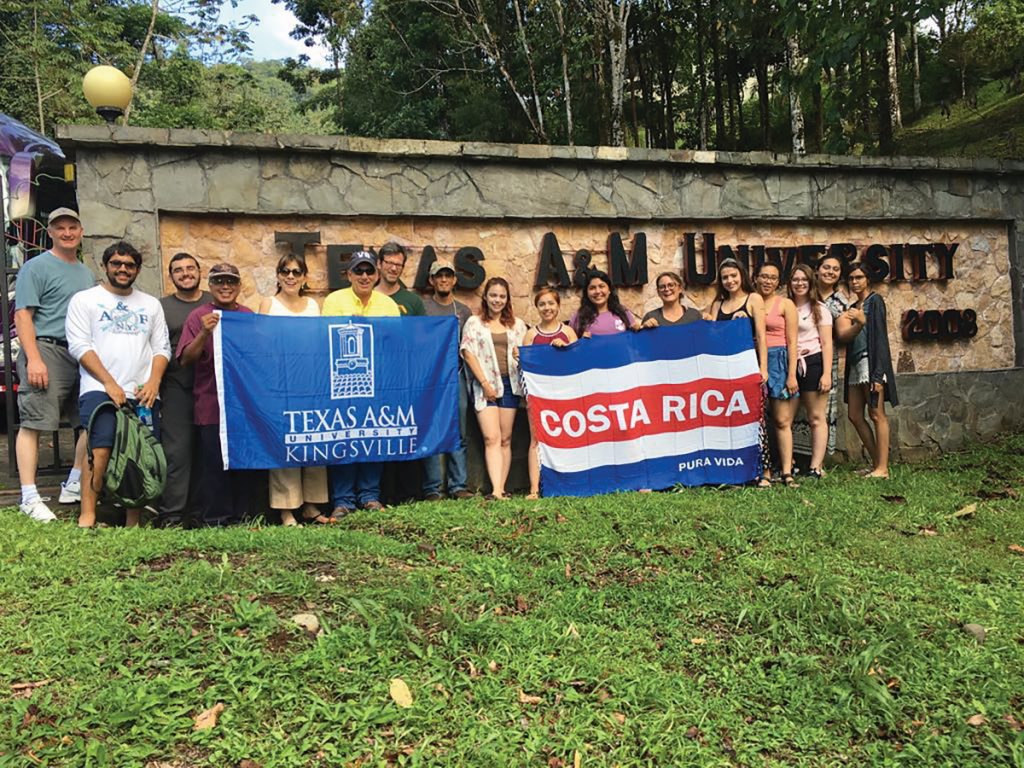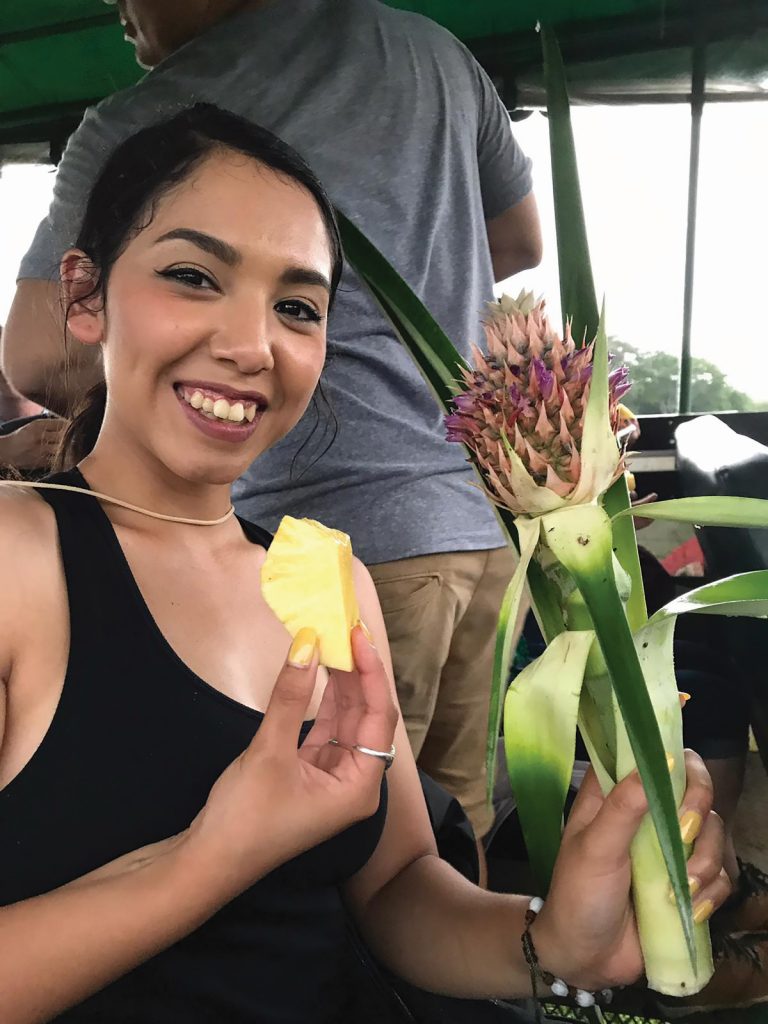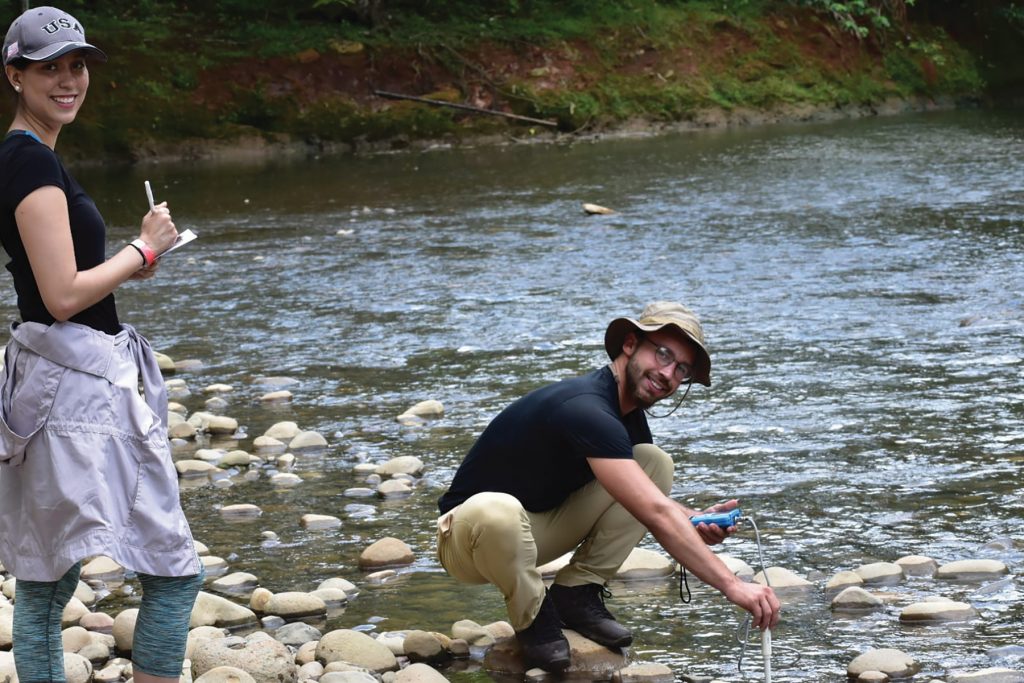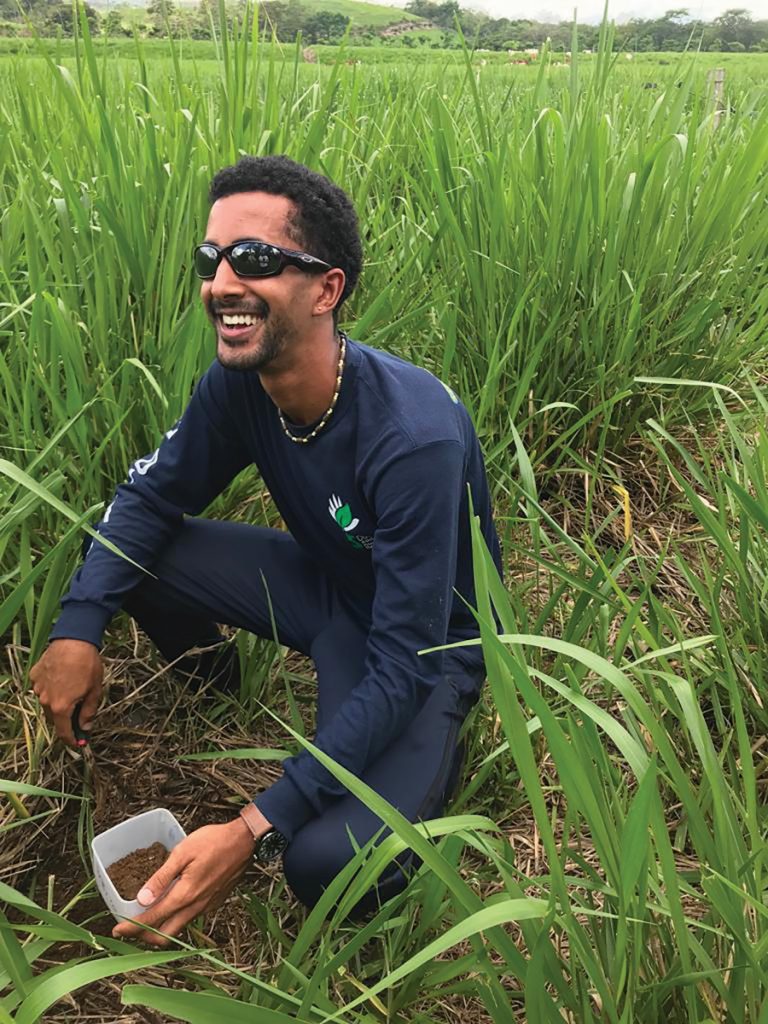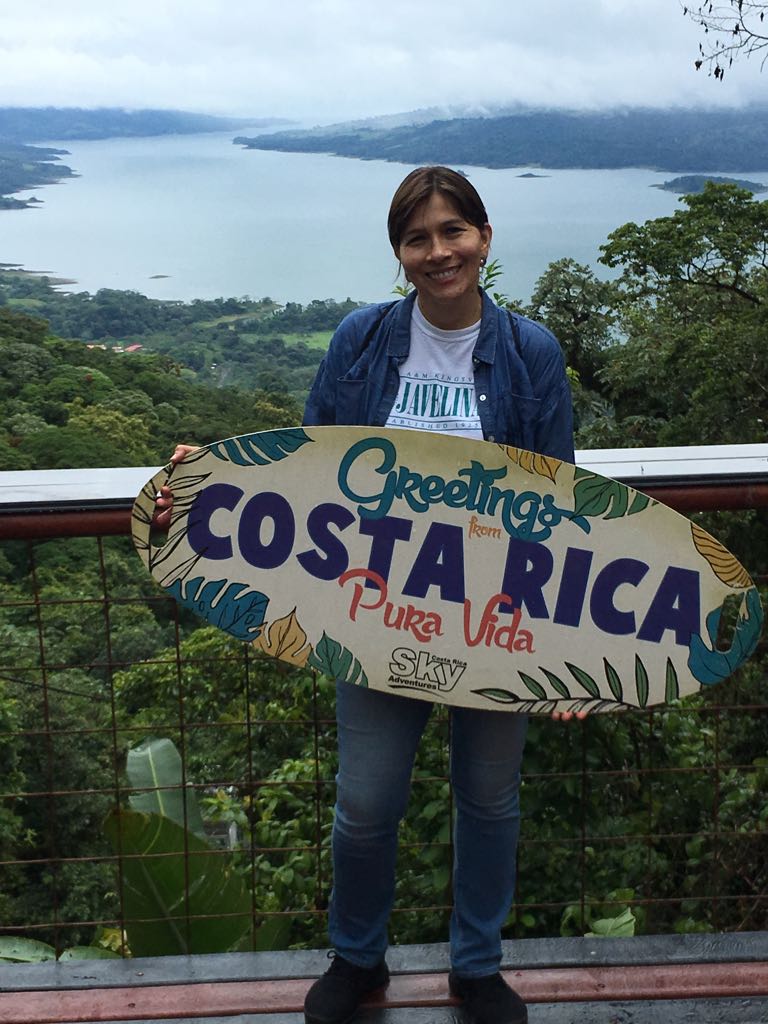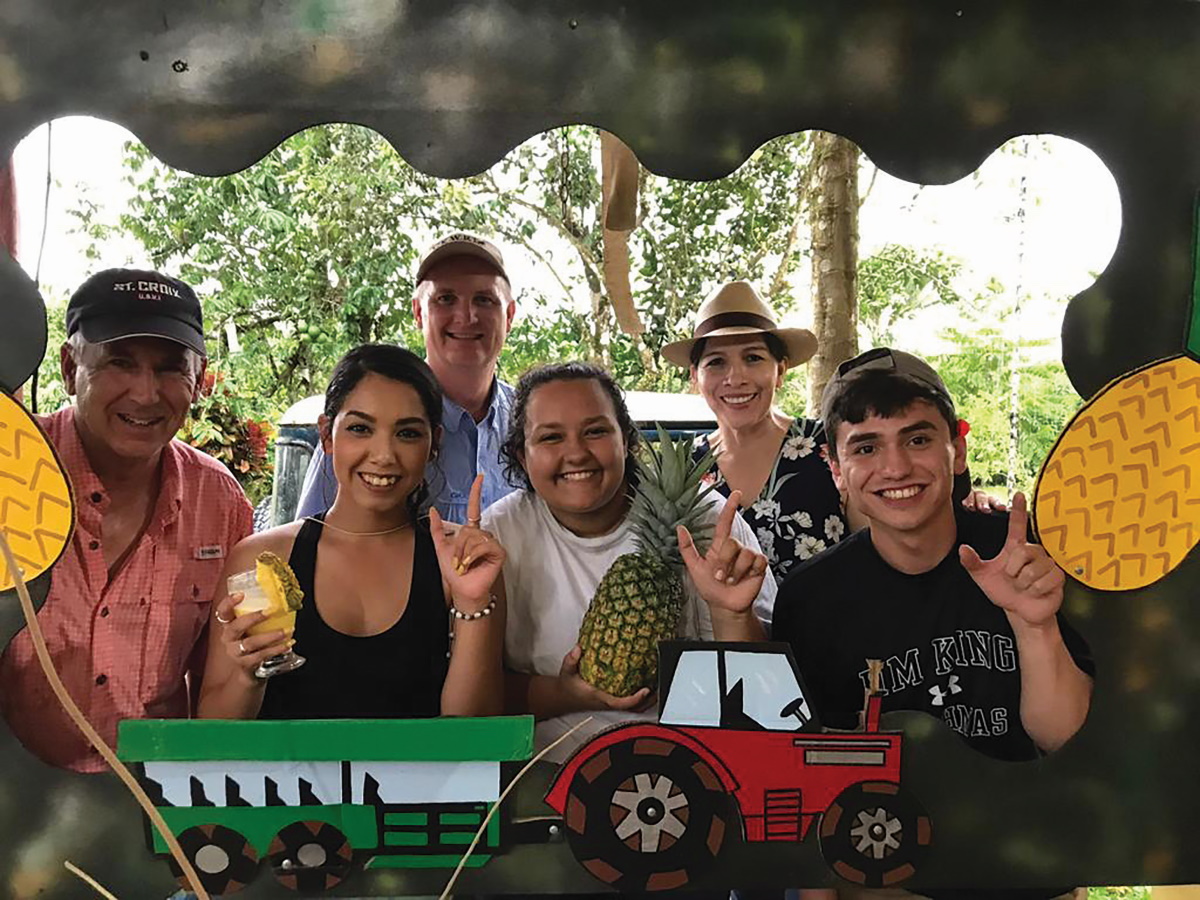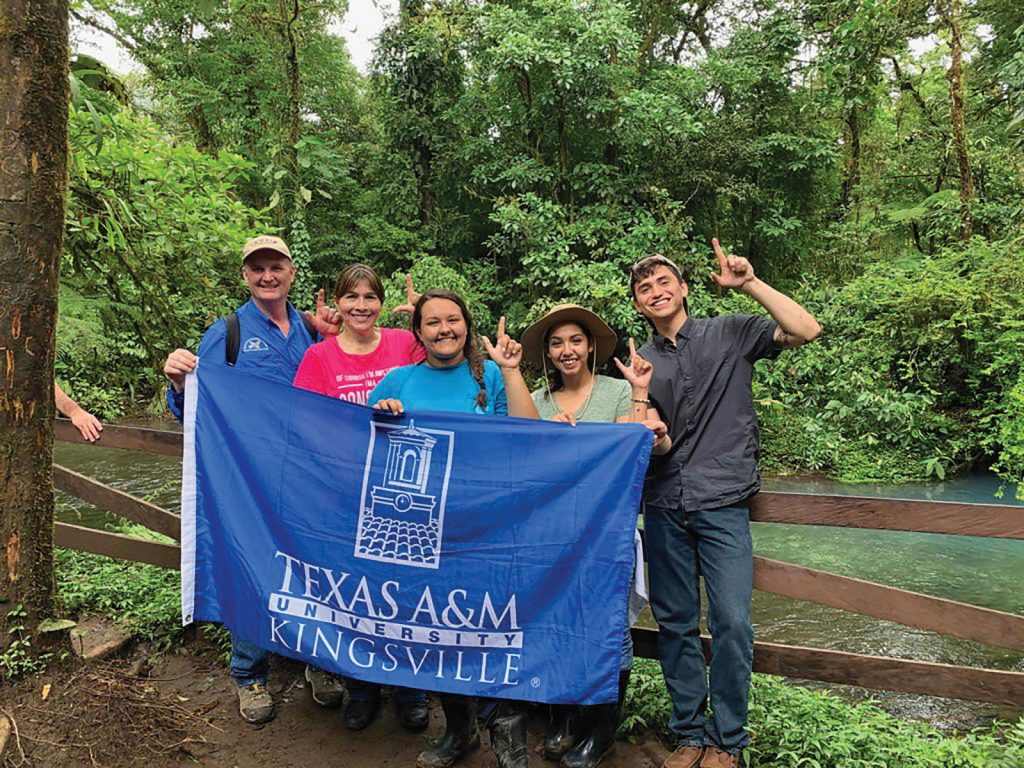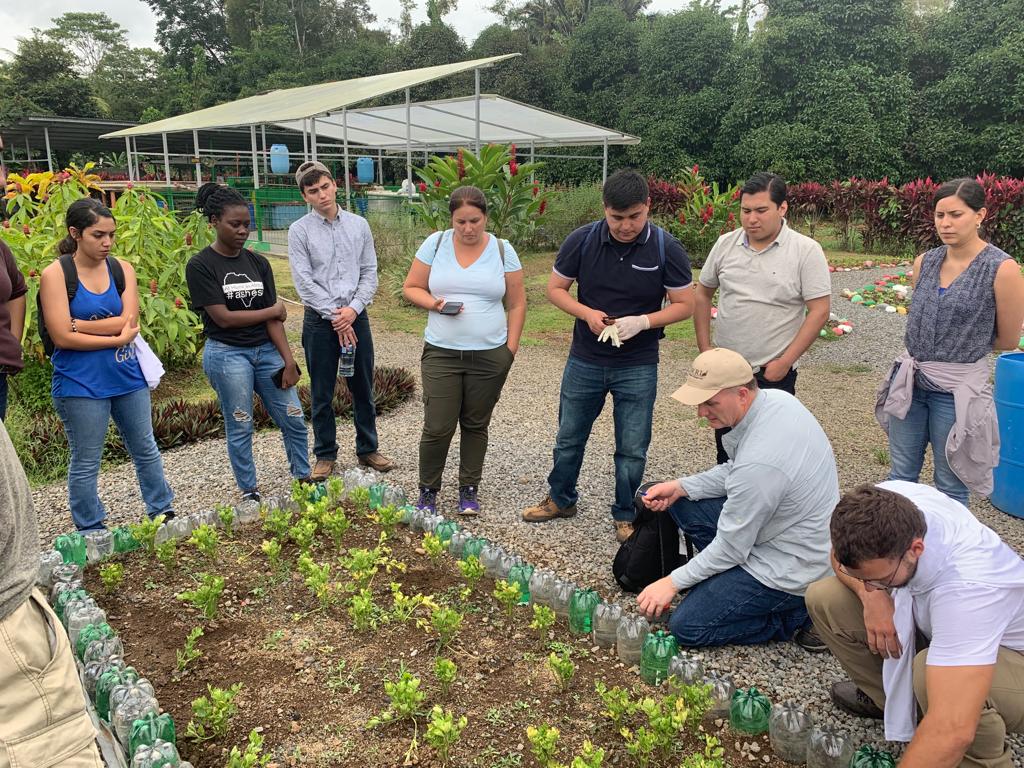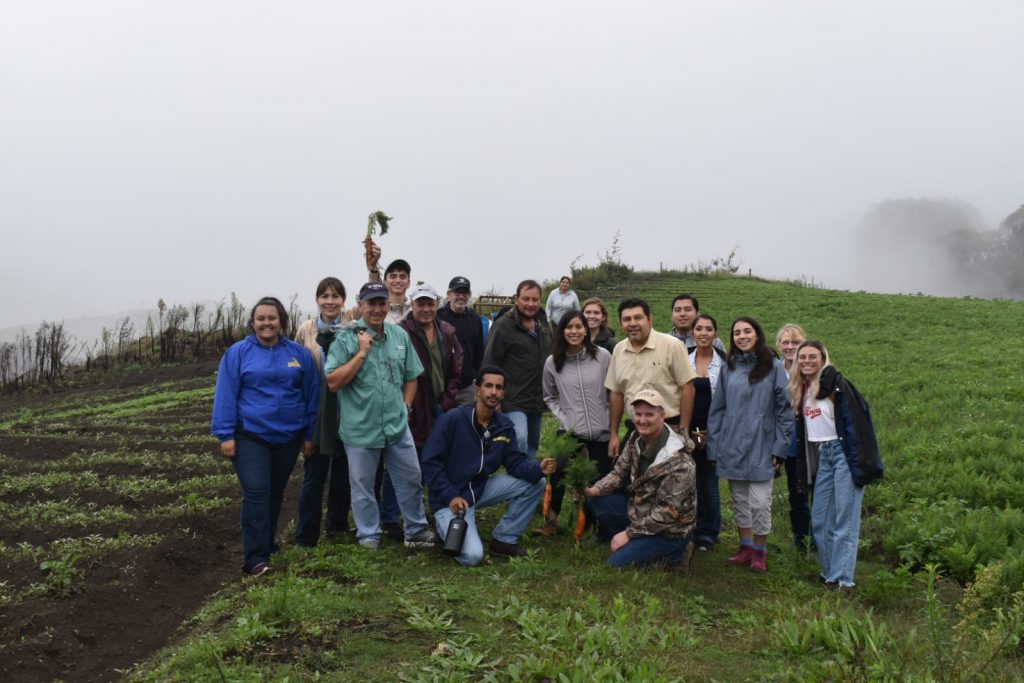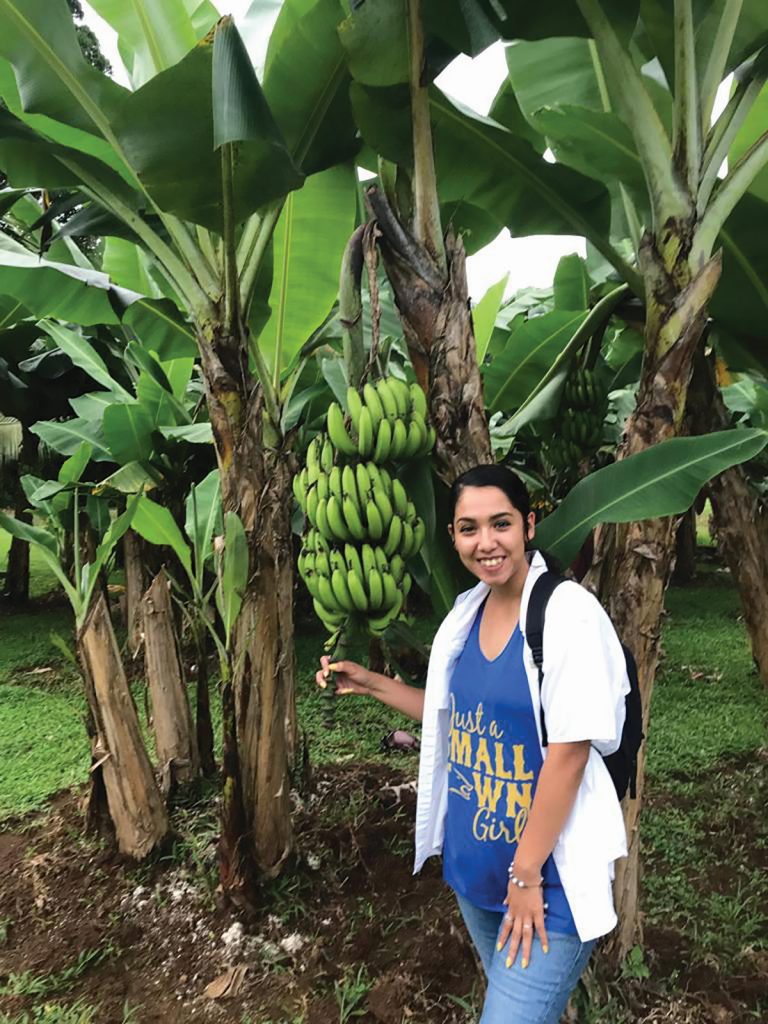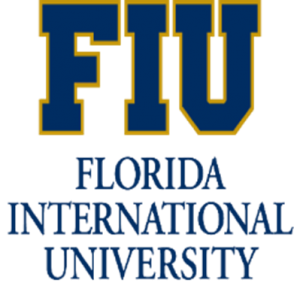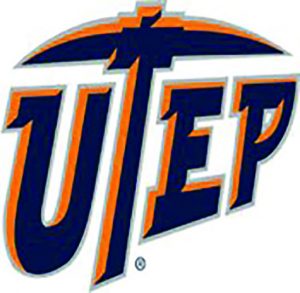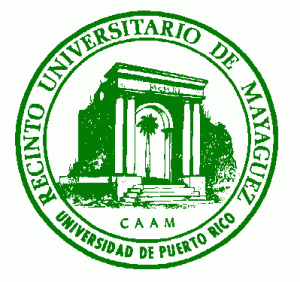Start now to reap the rewards later
Dr Shad Nelson and his team, based at Texas A&M University-Kingsville in the US, are passionate about increasing the number of Hispanics with advanced degrees in the sciences. The START NOW programme involves a unique two-week international study in Costa Rica, Central America, which has already boosted the number pursuing graduate school
HELPING STUDENTS GO FURTHER
The international study abroad, research-centred workshop experience in Costa Rica led to a higher percentage of student participants going on to graduate school, compared to students that only had a career-centred internship as an undergraduate in the same START NOW programme.
Students being trained by professors led to higher confidence and desire to pursue graduate school compared to peers seeking agriculture-oriented BS degrees.
• A total of 10 TAMU-Kingsville undergraduate students did research internships with non-faculty partners, 4 of which are now at graduate school (40%).
• A total of 9 TAMU-Kingsville undergraduate students attended the Costa Rica workshop led by faculty research mentors, 7 of which are now at graduate school (77.8%).
Shad concludes, “To increase the number of Hispanics with advanced degrees in the sciences, it is critical to create an atmosphere of faculty-mentored experiences for undergraduates in research.
International collaborative workshops and study abroad experiences can enhance student advancement for underserved minority populations in agricultural and science careers, and graduate school preparation .”
There are too few underserved minority populations in critical science disciplines, such as soil, plant and agriculturally related sciences, and this is clearly problematic. It is of critical importance to increase diversity within the agricultural science disciplines for without them, progress that could be made within these fields is hindered – if everybody was given a fair opportunity at contributing, progress and scientific achievement would know no bounds.
Hispanic Americans are one of the minority populations that are underrepresented in agricultural sciences and research fields, so efforts are being made to improve undergraduate Hispanic participation, through experiential learning in soil science, plant science and environmental science. This is one of the key motivations behind the creation of the START NOW (Student Training in Agricultural Research Techniques by Novel Occupational Workshops) programme, which is designed to complement existing educational and academic programmes, and help Hispanic undergraduates become more competitive and better represented within agricultural sciences and research.
Dr Shad D. Nelson is a professor and dean based within the Dick and Mary Lewis Kleberg College of Agriculture and Natural Resources, at Texas A&M University-Kingsville in the US. He is a passionate leader of the START NOW programme and recognises how important such programmes are at fostering inclusion and presenting opportunities to underrepresented minorities within agricultural science.
WHAT MAKES START NOW SO UNIQUE?
The START NOW programme provides a life-changing opportunity for students to take part in an international study abroad experience in Costa Rica. The programme introduces students to sustainable tropical agricultural practices and trains them through applied research-focused workshops. The undergraduate students are given the opportunity to work with other students and faculty mentors from four different Hispanic-serving universities: Texas A&M University—Kingsville, University of Texas at El Paso, Florida International University and University of Puerto Rico-Mayaguez.
HOW IS THE PROGRAMME STRUCTURED?
The START NOW programme is competitive, but once the students are selected, they go through preparatory training workshops before studying abroad. “In Costa Rica, students visit agricultural universities, research companies, farms and rural community businesses,” explains Shad. “They learn about sustainable agricultural practices incorporating soil health and water quality management, highland and low-valley crop production and animal husbandry. Students are also trained in proper research sampling techniques, taking soil and water samples from various agricultural sites, followed by sample analysis at the Texas A&M University Soltis Center located in San Isidro, Costa Rica.” Students work in collaborative teams and present their research findings prior to leaving Costa Rica.
WHY IS THE TIME STUDENTS SPEND WITH FACULTY SO IMPORTANT?
Many minority students are first generation college students and are often the first to obtain a college degree in their family – therefore, graduate school is not something many of them would consider automatically on entering college. “When students are engaged in research alongside a faculty mentor it has a profound impact on building their self-confidence, as they know an adult peer believes in their abilities,” says Shad. “Students not only see their skills develop, they also learn they have an aptitude for science.” Importantly, the two-week study abroad experience allows students and faculty members to spend quality time together, as well as having discussions during the discovery process. This can help students understand their potential and realise they are ready for graduate school.
WHAT HIGHLIGHTS AND SUCCESS STORIES HAS THE PROGRAMME SEEN SO FAR?
The START NOW programme has directly shown that if institutions want to increase the number of minorities in careers that require MS or PhD degrees, involvement with faculty mentors early on in the college experience is critical. “The impact and importance of faculty engagement by the two-week Costa Rica trip has led to a much higher percentage of students going on to graduate school than compared to those who only had a career-focused summer internship with US Department of Agriculture agency partners,” explains Shad. “The number of doctoral graduates from minority Hispanic populations is very low and without programmes like this that support close faculty-student interaction, these numbers will continue to be suppressed in higher education institutions. Funding support for undergraduate research experiences with faculty mentor engagement is essential, otherwise the long-term impacts are fewer minorities considering and pursuing graduate MS and PhD degrees.”
DOES THE PROGRAMME BENEFIT THE FACULTY AND INDUSTRY PROFESSIONALS WHO ARE INVOLVED?
Yes! Soil, plant, animal and environmental sciences are disciplines that require research and personal experiences that exist outside of the classroom. Information can be obtained from textbooks and conversations, but nothing beats working out in the field. The faculty members involved in START NOW are engaged in applied, hands-on learning workshops, which is beneficial to their own professional development. Of course, seeing underrepresented students exploring different fields of science for the first time is extremely rewarding.
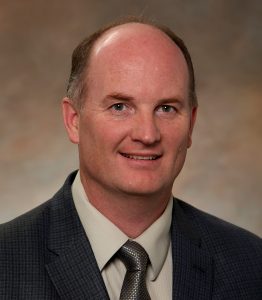 DR SHAD D. NELSON
DR SHAD D. NELSON
Professor and Dean, Dick and Mary Lewis Kleberg College of Agriculture and Natural Resources, Texas A&M University-Kingsville, USA
FIELD OF RESEARCH: Soil, Plant and Water Sciences
RESEARCH PROJECT: START NOW is a programme that seeks to improve Hispanic participation in agriculture through experiential learning in soil science, plant science and environmental science. The students who are selected take part in an international study abroad experience in Costa Rica.
FUNDER: USDA-NIFA Hispanic Serving Institutions (grant award no. 2016-38422-25542)American Association for the Advancement of Science (AAAS) Women’s International Science Collaboration Program; University Of Vermont
STUDENT PROFILES
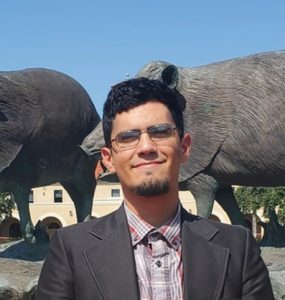
Name: Christopher Flores-Lopez
Major: Master of Agriculture Science, Agribusiness
Current role/studies: M.S. student working under the NSFCREST Project
The faculty and staff at Texas A&M University-Kingsville (TAMUK) work hard to provide their students with opportunities to enhance their applied research skills. I became part of START NOW by taking advantage of those opportunities and have done my best to learn as much as possible from the experience.
The research my team and I worked on in Costa Rica focused on the water quality of the area. We took several water samples throughout the trip and measured the total amount of nitrogen and phosphorus in it.
One of the main highlights of the trip was the on-farm workshops. It was a unique experience to see how agriculture production varies in another country. Foundationally, agriculture in Costa Rica is the same as it is in the United States, however, there is a technological and resource gap between the US and Costa Rica. Therefore, many of the farmers and producers of the area had to come up with innovative ways to improve their production.
The workshop challenged my way of thinking. I had become so accustomed to the culture of the US that I had a hard time imagining life anywhere else. This trip challenged my world view!
I collaborated with students from Florida and Puerto Rico, as well as other Texas students. The students I keep in contact with seem to be doing very well. Meeting new people is always a blessing and our different backgrounds and life experiences helped me to expand my horizons and way of thinking.
After graduating, I am hoping that I can find a career that helps me accomplish two goals. One, to provide for my future family and me. Two, to give back to a community that has done so much for me.
While it may seem that a lot of what you are doing now is not realistic or does not matter, the work you are doing right now in your classes is helping you lay down the foundation for whatever you will do later on. Create a strong work ethic. Do the best you can and provide the highest quality work you can give. Never let anything wait until the last minute.
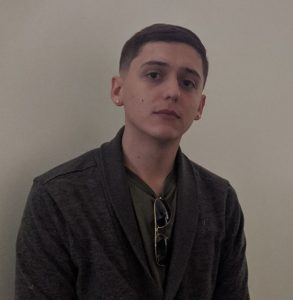
Name: Jonah E. Trevino
Major: Horticulture
Current role/studies: M.S. Graduate Research Assistant – Studying Therapeutic Horticulture
My project in START NOW was concerned with water quality. We took water samples from multiple rivers and streams near agricultural land, natural areas, and near small population towns. We checked the water for nitrogen and phosphorus levels and presented our results.
Reference
https://doi.org/10.33424/FUTURUM98
HELPING STUDENTS GO FURTHER
The international study abroad, research-centred workshop experience in Costa Rica led to a higher percentage of student participants going on to graduate school, compared to students that only had a career-centred internship as an undergraduate in the same START NOW programme.
Students being trained by professors led to higher confidence and desire to pursue graduate school compared to peers seeking agriculture-oriented BS degrees.
• A total of 10 TAMU-Kingsville undergraduate students did research internships with non-faculty partners, 4 of which are now at graduate school (40%)
• A total of 9 TAMU-Kingsville undergraduate students attended the Costa Rica workshop led by faculty research mentors, 7 of which are now at graduate school (77.8%) Shad concludes, “To increase the number of Hispanics with advanced degrees in the sciences, it is critical to create an atmosphere of faculty-mentored experiences for undergraduates in research.
International collaborative workshops and study abroad experiences can enhance student advancement for underserved minority populations in agricultural and science careers, and graduate school preparation .”
There are too few underserved minority populations in critical science disciplines, such as soil, plant and agriculturally related sciences, and this is clearly problematic. It is of critical importance to increase diversity within the agricultural science disciplines for without them, progress that could be made within these fields is hindered – if everybody was given a fair opportunity at contributing, progress and scientific achievement would know no bounds.
Hispanic Americans are one of the minority populations that are underrepresented in agricultural sciences and research fields, so efforts are being made to improve undergraduate Hispanic participation, through experiential learning in soil science, plant science and environmental science. This is one of the key motivations behind the creation of the START NOW (Student Training in Agricultural Research Techniques by Novel Occupational Workshops) programme, which is designed to complement existing educational and academic programmes, and help Hispanic undergraduates become more competitive and better represented within agricultural sciences and research.
Dr Shad D. Nelson is a professor and dean based within the Dick and Mary Lewis Kleberg College of Agriculture and Natural Resources, at Texas A&M University-Kingsville in the US. He is a passionate leader of the START NOW programme and recognises how important such programmes are at fostering inclusion and presenting opportunities to underrepresented minorities within agricultural science.
WHAT MAKES START NOW SO UNIQUE?
The START NOW programme provides a life-changing opportunity for students to take part in an international study abroad experience in Costa Rica. The programme introduces students to sustainable tropical agricultural practices and trains them through applied research-focused workshops. The undergraduate students are given the opportunity to work with other students and faculty mentors from four different Hispanic-serving universities: Texas A&M University—Kingsville, University of Texas at El Paso, Florida International University and University of Puerto Rico-Mayaguez.
HOW IS THE PROGRAMME STRUCTURED?
The START NOW programme is competitive, but once the students are selected, they go through preparatory training workshops before studying abroad. “In Costa Rica, students visit agricultural universities, research companies, farms and rural community businesses,” explains Shad. “They learn about sustainable agricultural practices incorporating soil health and water quality management, highland and low-valley crop production and animal husbandry. Students are also trained in proper research sampling techniques, taking soil and water samples from various agricultural sites, followed by sample analysis at the Texas A&M University Soltis Center located in San Isidro, Costa Rica.” Students work in collaborative teams and present their research findings prior to leaving Costa Rica.
WHY IS THE TIME STUDENTS SPEND WITH FACULTY SO IMPORTANT?
Many minority students are first generation college students and are often the first to obtain a college degree in their family – therefore, graduate school is not something many of them would consider automatically on entering college. “When students are engaged in research alongside a faculty mentor it has a profound impact on building their self-confidence, as they know an adult peer believes in their abilities,” says Shad. “Students not only see their skills develop, they also learn they have an aptitude for science.” Importantly, the two-week study abroad experience allows students and faculty members to spend quality time together, as well as having discussions during the discovery process. This can help students understand their potential and realise they are ready for graduate school.
WHAT HIGHLIGHTS AND SUCCESS STORIES HAS THE PROGRAMME SEEN SO FAR?
The START NOW programme has directly shown that if institutions want to increase the number of minorities in careers that require MS or PhD degrees, involvement with faculty mentors early on in the college experience is critical. “The impact and importance of faculty engagement by the two-week Costa Rica trip has led to a much higher percentage of students going on to graduate school than compared to those who only had a career-focused summer internship with US Department of Agriculture agency partners,” explains Shad. “The number of doctoral graduates from minority Hispanic populations is very low and without programmes like this that support close faculty-student interaction, these numbers will continue to be suppressed in higher education institutions. Funding support for undergraduate research experiences with faculty mentor engagement is essential, otherwise the long-term impacts are fewer minorities considering and pursuing graduate MS and PhD degrees.”
DOES THE PROGRAMME BENEFIT THE FACULTY AND INDUSTRY PROFESSIONALS WHO ARE INVOLVED?
Yes! Soil, plant, animal and environmental sciences are disciplines that require research and personal experiences that exist outside of the classroom. Information can be obtained from textbooks and conversations, but nothing beats working out in the field. The faculty members involved in START NOW are engaged in applied, hands-on learning workshops, which is beneficial to their own professional development. Of course, seeing underrepresented students exploring different fields of science for the first time is extremely rewarding.
This title relates to my work in five main areas: communications, information services, research, education, and monitoring and impact assessment. This means that I provide climate data, along with expert opinions and recommendations, to Vermont citizens and beyond. I also work closely with Vermont State agencies on topics such as groundwater resilience and planning for climate change. I am also called upon to work with regional decision-makers and am often interviewed by the media.
LEAD EDITOR OF ‘HISTORICAL CLIMATE VARIABILITY AND IMPACTS IN NORTH AMERICA’
This work was the first of its kind in the US to piece together climate variations over the last 200-300 years in order to set modern-day climate change into a longer-term context. A lot of the research can be gleaned from meticulously combing through historical documents, such as archive books, maps, newspapers and even old diaries. I hope this book will continue to highlight the importance of such interdisciplinary skills to broaden our knowledge about the past, present and future.
 DR SHAD D. NELSON
DR SHAD D. NELSON
Professor and Dean, Dick and Mary Lewis Kleberg College of Agriculture and Natural Resources, Texas A&M University-Kingsville, USA
FIELD OF RESEARCH: Soil, Plant and Water Sciences
RESEARCH PROJECT: START NOW is a programme that seeks to improve Hispanic participation in agriculture through experiential learning in soil science, plant science and environmental science. The students who are selected take part in an international study abroad experience in Costa Rica.
FUNDER: USDA-NIFA Hispanic Serving Institutions (grant award no. 2016-38422-25542)American Association for the Advancement of Science (AAAS) Women’s International Science Collaboration Program; University Of Vermont
STUDENT PROFILES

Name: Christopher Flores-Lopez
Major: Master of Agriculture Science, Agribusiness
Current role/studies: M.S. student working under the NSFCREST Project
The faculty and staff at Texas A&M University-Kingsville (TAMUK) work hard to provide their students with opportunities to enhance their applied research skills. I became part of START NOW by taking advantage of those opportunities and have done my best to learn as much as possible from the experience.
The research my team and I worked on in Costa Rica focused on the water quality of the area. We took several water samples throughout the trip and measured the total amount of nitrogen and phosphorus in it.
One of the main highlights of the trip was the on-farm workshops. It was a unique experience to see how agriculture production varies in another country. Foundationally, agriculture in Costa Rica is the same as it is in the United States, however, there is a technological and resource gap between the US and Costa Rica. Therefore, many of the farmers and producers of the area had to come up with innovative ways to improve their production.
The workshop challenged my way of thinking. I had become so accustomed to the culture of the US that I had a hard time imagining life anywhere else. This trip challenged my world view!
I collaborated with students from Florida and Puerto Rico, as well as other Texas students. The students I keep in contact with seem to be doing very well. Meeting new people is always a blessing and our different backgrounds and life experiences helped me to expand my horizons and way of thinking.
After graduating, I am hoping that I can find a career that helps me accomplish two goals. One, to provide for my future family and me. Two, to give back to a community that has done so much for me.
While it may seem that a lot of what you are doing now is not realistic or does not matter, the work you are doing right now in your classes is helping you lay down the foundation for whatever you will do later on. Create a strong work ethic. Do the best you can and provide the highest quality work you can give. Never let anything wait until the last minute.

Name: Jonah E. Trevino
Major: Horticulture
Current role/studies: M.S. Graduate Research Assistant – Studying Therapeutic Horticulture
My project in START NOW was concerned with water quality. We took water samples from multiple rivers and streams near agricultural land, natural areas, and near small population towns. We checked the water for nitrogen and phosphorus levels and presented our results.
The main highlight was visiting agricultural farms. It was amazing seeing sustainable agricultural practices first-hand. I also enjoyed the trip to Earth University, as they showed their sustainable practices to us; seeing what students did to educate themselves as well as provide for the university blew my mind.
I had to come out of my shell quickly. Although we were only there for two weeks, I soon made friends and the experience helped me realise I was able to adjust to new environments with new people quickly.
Dr David Sotomayor, from University of Puerto Rico at Mayaguez, and Guadalupe Alvarez Rodriguez, from The University of Texas at El Paso, both greatly impacted my experience. When we were stuck after collecting our data, we were ensured that there is always an answer hidden in the numbers. This was a great insight that has shaped my work since.
START NOW has encouraged me to keep an open mind when deciding what I want to do in life. When I was younger, I was always obsessed with the thought of having a self-sufficient homestead, but I would have never thought my curiosity for it would help me continue my education. I am excited about the future.
My dream is to complete my PhD, become a Horticultural Therapist-Registered, get some work experience in my field, and start my own therapy farm. The internship has helped shape my future career path and I would like to work with at-risk youth, rehab patients, or mental health patients with vocational therapy sessions. Of course, things always change, but that is the plan at
the moment!
One thing I learned after the internship is that sometimes we don’t entirely know what we want. I encourage students to embrace challenges and make things happen, whether that be by attending meetings for internships, or improving your grades to give yourself a better chance of getting an internship. Do not wait for things to happen; START making them happen NOW!
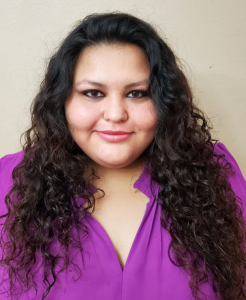
Name: Cynthia Puente
Major: Plant and Soil Sciences
Current role/studies: Master’s in science
I collaborated with William Scally from Florida International University, under the guidance of Dr Nelson, to carry out research on the number of nematodes and species found in soil. My study involved comparing nematode counts found in different types of soils around Costa Rica – I looked at different locations and how the presence of these organisms promotes or hinders
plant health.
I loved meeting, collaborating and learning with students from other academic institutions. Most of us had different degrees which allowed us to share different perspectives on agriculture sustainability. It was exciting to visit sustainable farms such as Don Juan Organic farm and Finca Luna Nueva, and tour Earth University.
The workshop helped me gain confidence to meet new people, establish relationships and work in a team. Listening to different opinions and suggestions made me grow as a person and bettered my internship experience.
The project motivated me to continue as a student researcher back at TAMUK. It convinced me that this pathway is the right one for me and that I wanted to continue my education in plant and soil sciences by applying for a master’s degree.
I am ambitious and, in the future, I want to apply the knowledge I have gained to the wider community by joining the United States Department of Agriculture, working in plant protection for the Animal and Plant Inspection Service, or becoming an agricultural specialist for US Customs.
The one piece of advice I would give to budding scientists is to get out of your comfort zone. Challenge yourself! If you like plant and soil sciences, then ask faculty members about research opportunities – it is a great way to gain experience and will help you decide whether it is the right pathway for you.
HOW TO BECOME A SOIL SCIENTIST
• The Soil Science Society of America is a brilliant resource for those interested in learning more about the field: https://www.soils.org/
• The United States Department of Agriculture has a section dedicated to careers in soil science, from what it entails through to how to become a soil scientist: https://www.nrcs.usda.gov/wps/portal/nrcs/detail/soils/edu/?cid=nrcs142p2_054277
• The average salary for a soil scientist is $58,652, with positions in the field typically spanning from $39,000 to $91,000, depending on the level of experience.
PATHWAY FROM SCHOOL TO SOIL, PLANT AND WATER SCIENCES
Shad believes that for those interested in working in the field of soil, plant and water sciences, studying subjects such as chemistry, biology, agricultural science, horticulture and environmental science is beneficial.
https://www.careerexplorer.com/careers/soil-and-plant-scientist/how-to-become/
SHAD’S TOP TIPS FOR STUDENTS
1 – Be proactive, where possible. If you want to be part of a research project, then approach your teacher, explain your desire and they will likely help you in any way they can. Your tutors are there to help you and if you show that you are willing, you will be rewarded.
2 – Through the course of your studies and engaging in research, you will find that you have skills you never even knew about. There is a lot of untapped potential bubbling under the surface and drawing it out is one of the most satisfying feelings.
3 – Take every opportunity – if you can gain experience from a professional mentor then do so. Real-life training could change your life and help you to find a career that you love.
Write it in the comments box below and Shad, Christopher, Jonah or Cynthia will get back to you. (Remember, researchers are very busy people, so you may have to wait a few days.)



